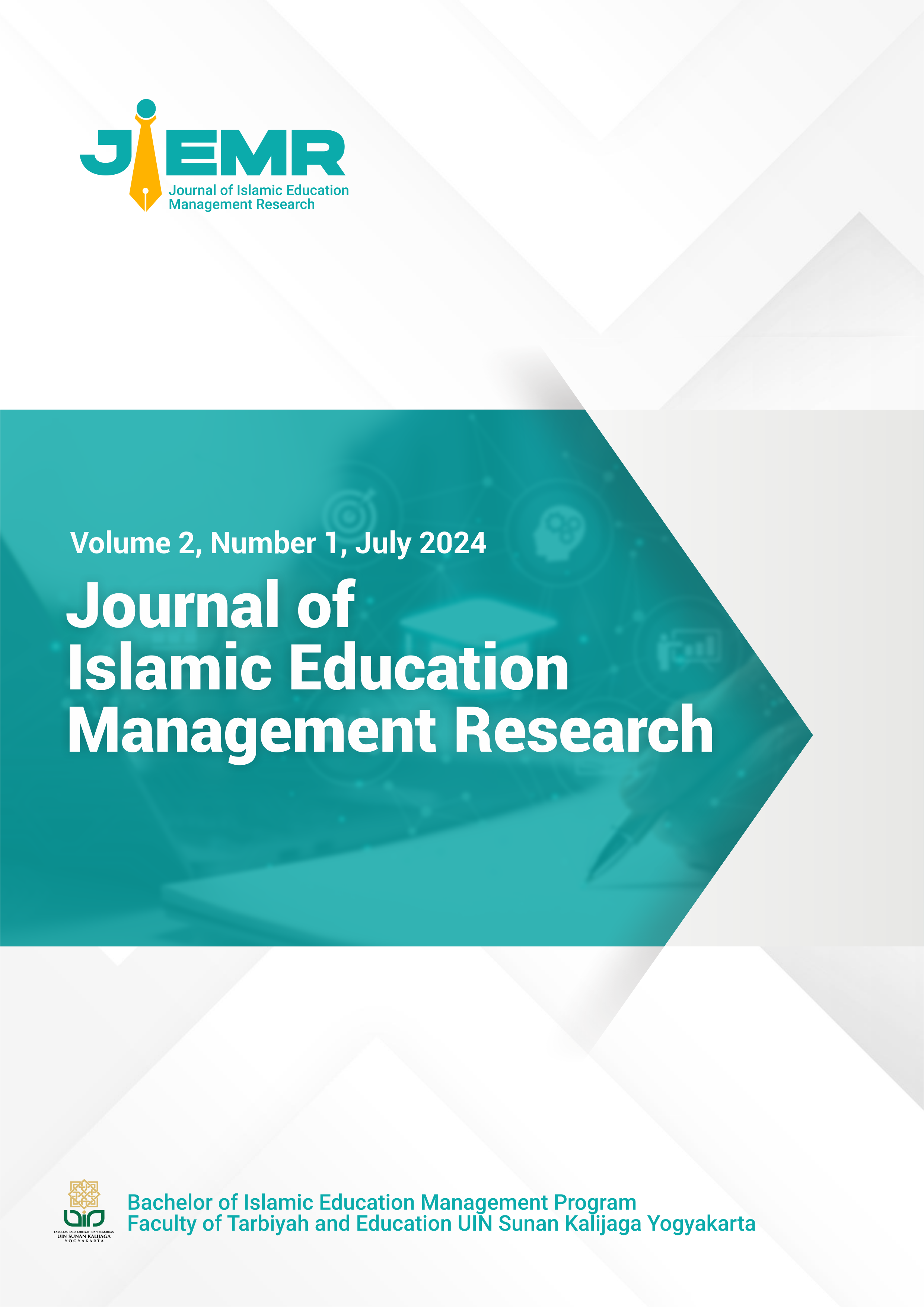Enhancing Islamic Education Through PAIS Work Programs: A Case Study in Sleman District's Ministry of Religious Affairs
DOI:
https://doi.org/10.14421/jiemr.2024.21-09Keywords:
Ministry of Religious Affairs, PAIS Work Programs, Professional Development, Sleman DistrictAbstract
Purpose – This study aims to explore the effectiveness of the Islamic Education Program Work (PAIS) in enhancing the professionalism of Islamic Education teachers (PAI) and its impact on the development of Islamic education within Sleman District's Ministry of Religious Affairs. By identifying strengths, limitations, and areas for improvement in these programs, the research seeks to provide valuable insights and recommendations that can guide future strategies and initiatives in the field of Islamic education.
Design/methods – Adopting a qualitative research methodology with a descriptive case study design, this research was set in the Ministry of Religious Affairs in Sleman District. The study employed a variety of data collection methods including observation, semi-structured interviews, and literature review. The primary participant was the head of the PAIS work unit, Mr. Sangaji, S.H.I. Data analysis involved data reduction, data display, and data verification phases to ensure the validity and accuracy of the findings.
Findings – The research revealed that PAIS work programs significantly contribute to the professional development of PAI teachers and the overall quality of Islamic education. These programs support strategic planning, stakeholder engagement, and the incorporation of technology in education, thus creating a dynamic and effective educational environment. However, challenges such as limited funding, competency and commitment standardization, and optimal parental support were identified.
Research implications/limitations – The implications of this research extend beyond Sleman District, providing insights into the potential of targeted educational programs to enhance Islamic education quality. However, the study is limited by its focus on a single institution and the specific cultural and administrative context of Indonesia, which may influence the generalizability of the findings.
Practical implications – This study underscores the importance of strategic planning, stakeholder engagement, and technological integration in Islamic education. Addressing the identified challenges can aid in overcoming barriers to effective education and contribute to fostering a knowledgeable and ethical society.
Originality/value – This research offers a unique examination of the impact of digital transformation within the context of Islamic education in Indonesia, particularly through the lens of PAIS work programs in the Ministry of Religious Affairs. It contributes to the broader understanding of digital transformation in education, highlighting the intersection of technology, education, and culture in a religious educational setting.
References
Borelli, S., Gulemetova, M., & Paredes, M. (2023). Experimental impacts of teacher professional development on adolescent socio-emotional skills, achievement, and hazardous child labor: Evidence from a remedial school program in Ecuador. International Journal of Educational Research, 118. Scopus. https://doi.org/10.1016/j.ijer.2022.102095
Cigdemoglu, C., & Köseoğlu, F. (2019). Improving Science Teachers’ Views about Scientific Inquiry: Reflections from a Professional Development Program Aiming to Advance Science Centre-School Curricula Integration. Science and Education, 28(3–5), 439–469. Scopus. https://doi.org/10.1007/s11191-019-00054-0
Dille, K. B. (2022). An online teacher professional development programme as a boundary artefact for new school-based mentors. International Journal of Mentoring and Coaching in Education, 11(4), 381–397. Scopus. https://doi.org/10.1108/IJMCE-11-2021-0105
Drits-Esser, D., Gess-Newsome, J., & Stark, L. A. (2017). Examining the sustainability of teacher learning following a year-long science professional development programme for inservice primary school teachers. Professional Development in Education, 43(3), 375–396. Scopus. https://doi.org/10.1080/19415257.2016.1179664
Edwards, L. C., Bryant, A. S., Morgan, K., Cooper, S.-M., Jones, A. M., & Keegan, R. J. (2019). A professional development program to enhance primary school teachers’ knowledge and operationalization of physical literacy. Journal of Teaching in Physical Education, 38(2), 126–135. Scopus. https://doi.org/10.1123/jtpe.2018-0275
Hennessy, S., Haßler, B., & Hofmann, R. (2016). Pedagogic change by Zambian primary school teachers participating in the OER4Schools professional development programme for one year. Research Papers in Education, 31(4), 399–427. Scopus. https://doi.org/10.1080/02671522.2015.1073343
Kutnick, P., Gartland, C., & Good, D. (2022). Evaluating a programme for the continuing professional development of STEM teachers working within inclusive secondary schools in the UK. International Journal of Educational Research, 113. Scopus. https://doi.org/10.1016/j.ijer.2022.101974
Magpily, M. P. P., & Mercado, J. (2017). Competencies of teachers of children with autism spectrum disorder in inclusive elementary schools in the national capital region: Basis for a proposed training program for professional teachers. Turkish Online Journal of Educational Technology, 2017(December Special Issue ITEC), 115–128. Scopus.
Rijali, A. (2019). Analisis Data Kualitatif. Alhadharah: Jurnal Ilmu Dakwah, 17(33), 81. https://doi.org/10.18592/alhadharah.v17i33.2374
Sa’adah, M., Rahmayati, G. T., & Prasetiyo, Y. C. (2022). Strategi Dalam Menjaga Keabsahan Data Pada Penelitian Kualitatif. Jurnal Al ‘Adad: Jurnal Tadris Matematika, 1(2), 54–64.
Toran, M., & Güder, S. Y. (2020). Supporting teachers’ professional development: Examining the opinions of pre-school teachers attending courses in an undergraduate program. Pegem Egitim ve Ogretim Dergisi, 10(3), 809–868. Scopus. https://doi.org/10.14527/PEGEGOG.2020.026
Downloads
Published
Issue
Section
License
Copyright (c) 2024 Arlin Prima Sari

This work is licensed under a Creative Commons Attribution-NonCommercial-ShareAlike 4.0 International License.
Copyright Notice
Authors who publish with this journal agree to the following terms:
- Authors retain copyright and grant the journal right of first publication with the work simultaneously licensed under a Creative Commons Attribution-ShareAlike 4.0 International License that allows others to copy and redistribute the material in any medium or format with an acknowledgement of the work's authorship and initial publication in this journal and also allows to remix, transform, and build upon the material for any purpose, even commercially with contributions under the same license as the original.
- Authors are able to enter into separate, additional contractual arrangements for the non-exclusive distribution of the journal's published version of the work (e.g., post it to an institutional repository or publish it in a book), with an acknowledgement of its initial publication in this journal.
- Authors are permitted and encouraged to post their work online (e.g., in institutional repositories or on their website) prior to and during the submission process, as it can lead to productive exchanges, as well as earlier and greater citation of published work.









